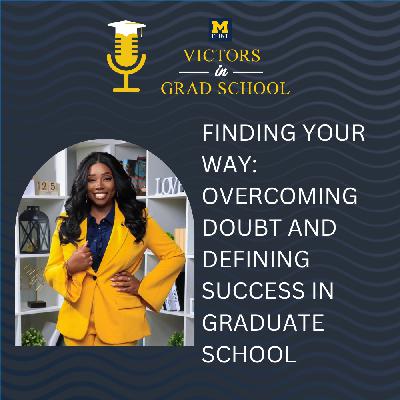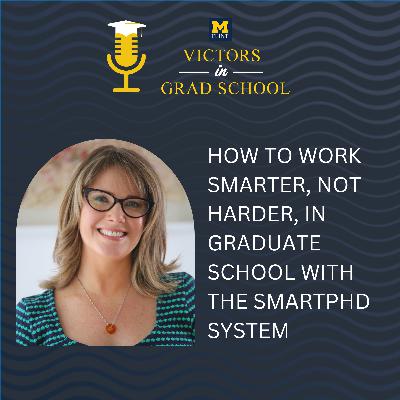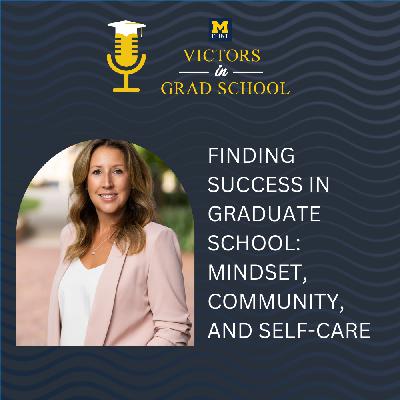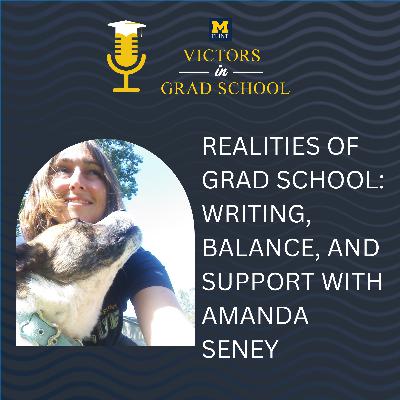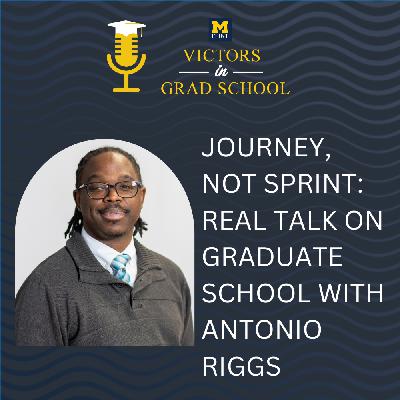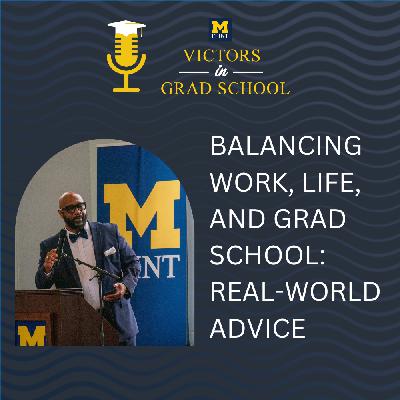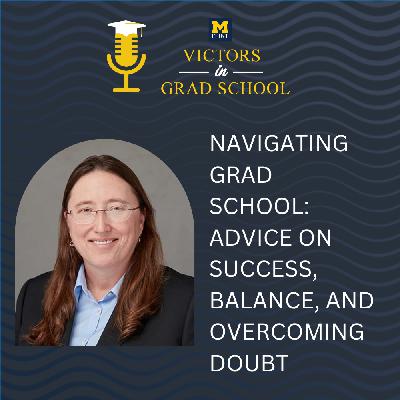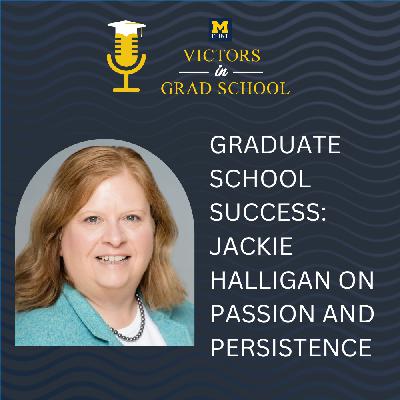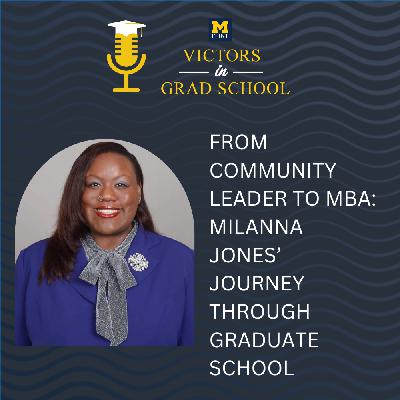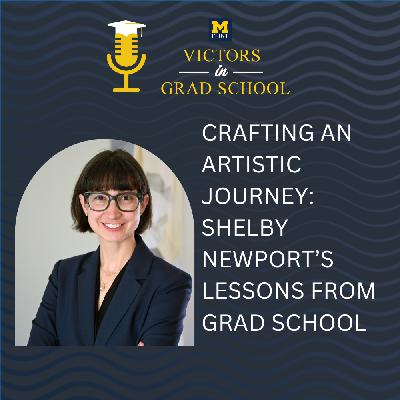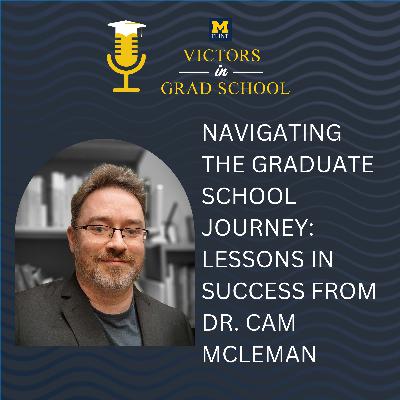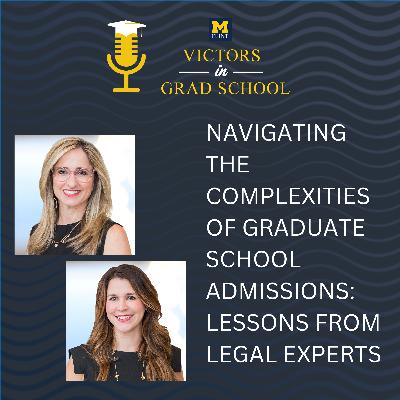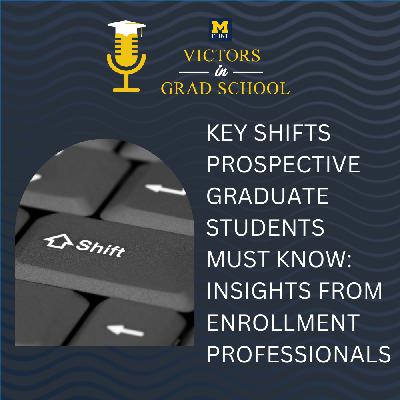Finding Your Way: Overcoming Doubt and Defining Success in Graduate School
Description
Embarking on the journey to graduate school can be both exhilarating and overwhelming. In the latest episode of the “Victors in Grad School” podcast, Dr. Christopher Lewis sits down with Dr. Juanita Tookes, Assistant Director for Counseling and Psychological Services (CAPS) at the University of Michigan Flint, to talk about her winding—and deeply personal—path through higher education. This insightful conversation is packed with valuable lessons and encouragement for anyone considering, or already pursuing, advanced degrees.
Embrace Your Own Timeline
One of the most powerful themes of this episode is the importance of honoring your unique path. Dr. Tookes shares candidly about taking breaks between each of her degrees—underscoring that there is no "one-size-fits-all" trajectory through academia. She explains how these pauses allowed her to gain hands-on experience (and even chase a dream of being on America’s Next Top Model!) before returning to her studies with renewed clarity and purpose. Her story is a reminder that whether you go straight through or take time off, your educational journey is yours to define.
The Power of Real-World Experience
Dr. Tookes’ journey highlights the value of real-world experience in shaping academic and career choices. Her early work in a child and family services nonprofit exposed her to social work, therapy, and the complexities of family systems—experiences that informed her eventual focus on counseling psychology. She encourages prospective students to seek out professional experiences, talk with people in the field, and use those insights to refine their goals.
Overcoming Self-Doubt and Imposter Syndrome
Transitioning to graduate school can trigger self-doubt, especially for those who see themselves as “nontraditional” students. Dr. Tookes bravely discusses her own struggles with imposter syndrome and negative thinking, and shares how reframing her mindset, celebrating small wins, and building a strong support network helped her persevere. Her honesty will resonate with anyone who has ever questioned their abilities or belonged in a program.
Seeking Guidance and Paying It Forward
Finally, Dr. Tookes emphasizes connecting with advisers, mentors, and peers—not only for academic support but also for personal encouragement. Her journey eventually led her to help other doctoral students as an academic adviser, filling a gap in support she’d wished for in her own experience.
If you’ve ever wondered what success in graduate school really looks like, this episode is for you. Listen to Dr. Juanita Tookes and gain practical wisdom, heartfelt encouragement, and a fresh perspective on your own educational path.
TRANSCRIPT
Dr. Christopher Lewis [00:00:01 ]:
Welcome to the victors in grad school, where we have conversations with students, alumni, and experts about what it takes to find success in graduate school.
Dr. Christopher Lewis [00:00:11 ]:
Welcome back to victors in grad school. I'm your host, doctor Christopher Lewis, director of graduate programs at the University of Michigan Flint, and really excited to have you back again this week as we are working together, as you're going through this path, this journey that you're on to consider graduate school, go to graduate school, whatever part you are in, it is a journey. I say that every week, but it is so true because for every person, that path, that journey is going to look a little bit different. It's gonna feel a little bit different. You're gonna have to work through the things that that you're challenged with as you're thinking about this and figuring it out if this is the right path for you. And that's why this podcast exists. This podcast is here to help you to be able to demystify the graduate school process, but also to give you some tools for your toolbox to help you in this journey. And I do that every week by introducing you to other people that have gone before you, that have gone to graduate school, that have learned some things along the way.
Dr. Christopher Lewis [00:01:17 ]:
Maybe everything went perfectly well. I'm gonna guess to say it didn't all go perfectly, but that you learn along the way and you can learn from these individuals and put those tools in your toolbox to help you to maybe miss that stumbling block. But if not, start planning for it and prepare yourself so that as you hit that stumbling block, you have some tools, you have some resources to draw from that'll help you through that. This week, we've got another great guest with us. Doctor Juanita Tookes is with us, and Doctor Tookes is a the assistant director for the counseling and psychological services, or CAPS, program at the University of Michigan Flint. She did her undergraduate and master's degree both at Wayne State University and then went and got her doctorate degree at Oakland University. And we're gonna talk about that journey that she went on to learn a little bit more about that. I'm really excited to have her here.
Dr. Christopher Lewis [00:02:15 ]:
Doctor Tuxt, thanks so much for being here today.
Dr. Juanita Tookes [00:02:17 ]:
Thank you so much for having me. It's an honor. It's always an honor when I'm invited to share my experience. And, of course, I know my experience is individual to me, but I hope something I say can be helpful to someone. So thank you for having me.
Dr. Christopher Lewis [00:02:30 ]:
Now, as I said, you did your undergraduate work at Wayne State University. And at some point during that degree in psychology, you made a decision. You made a choice. You decided that you were going to continue on and get that graduate degree. Can you bring me back to that point and talk to me about what was going through your head? What made you decide that you wanted to do that? Because I know that there was a little bit of time between the bachelor's and the master's as well.
Dr. Juanita Tookes [00:03:03 ]:
Yes. So this is such a long time ago. So when I graduated with my undergrad degree in 02/2008, I knew that I wanted to go higher in education. I knew that. I knew that I wanted to be a doctor since I was nine years old. Now at that age, I didn't know that there were different kinds of doctors. I just knew that I wanted to be one. But there is the preview of what you wanna do.
Dr. Juanita Tookes [00:03:29 ]:
There is the product of what actually comes out of it. But then there's this middle part called the process. So after I graduated with my undergrad degree, I did not go straight into graduate school. My brain was gone at the end of of my undergrad experience. It took me five years to complete that because I did not go to school in the summer. So it took me a little bit longer. And I just wanted to be without school for a little bit. Like, it was very intellectually challenging.
Dr. Juanita Tookes [00:03:58 ]:
It took a lot of my time. It was it was a lot. I was proud of it. I was happy that I did it. But I realized, unlike some of my peers who went straight into grad programs, I wanted to take a break. So what ended up happening is I found out through the psych department about, an internship. It was an internship in a child and family service organization in Detroit, and I applied for that and got it. And so what I did is I did my year internship there, and I got hired on as a full time employee.
Dr. Juanita Tookes [00:04:30 ]:
And I was doing data entry and analysis for this organization. And I actually was there for a few years. And so the way that I look at it is because sometimes I've heard people think that you just have I've heard both sides of this. So people think that it's bad to take breaks. You need to just go straight through. And it's not bad. I think that whether you take breaks or you go straight through, just make sure that you're making the decision that's best for you. It's not about what other people think.
Dr. Juanita Tookes [00:04:58 ]:
It's about what's best for you. It was best for me because I got to get some hands on real life experience in the area that I said that I wanted to work in. I knew I wanted to be in the helping professions. I knew that I wanted to study psychology. And so being at a child and family service nonprofit organization allowed me to interact a lot with social workers and therapists. This organization mainly worked with teenagers, so I was able to understand some things about the judicial system in relation to in relation to several things. So drug use, abuse and misuse, family systems. We were working with adjudicated youth, so youth that were who had committed some offenses, and they had to go to the court to get those offenses rectified.
Dr. Juanita Tookes [00:05:48 ]:
Really learning a lot from the social workers and understanding that area, even though that's not what I was going for. Social work really helped enhance my knowledge about resources in the community that can help families, which were was inclusive of therapy. So my decision to go into grad school after my break was it was kind of like an internal it was an internal thing. I was traveling for two years. I was pursuing interests outside of academics. At this time, I was trying to be America's next top model at this time. So I was traveling and, like, pursuing modeling, trying to get assigned to an agency.

